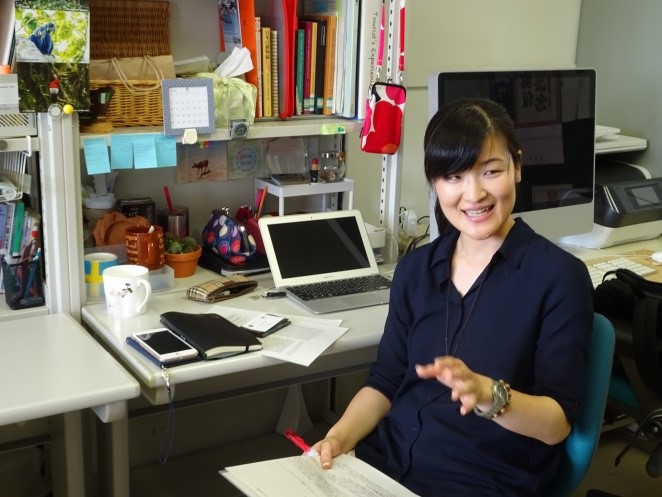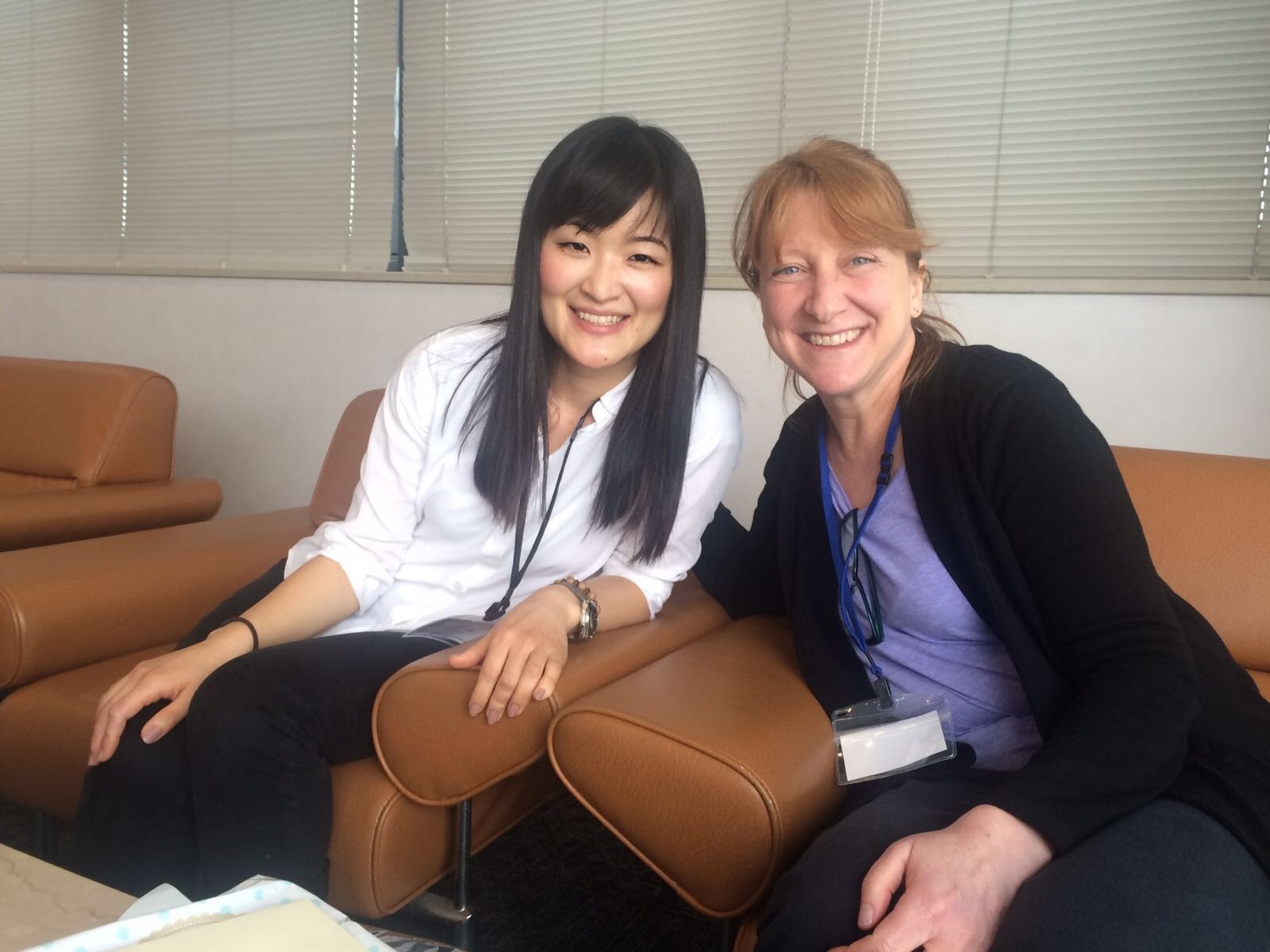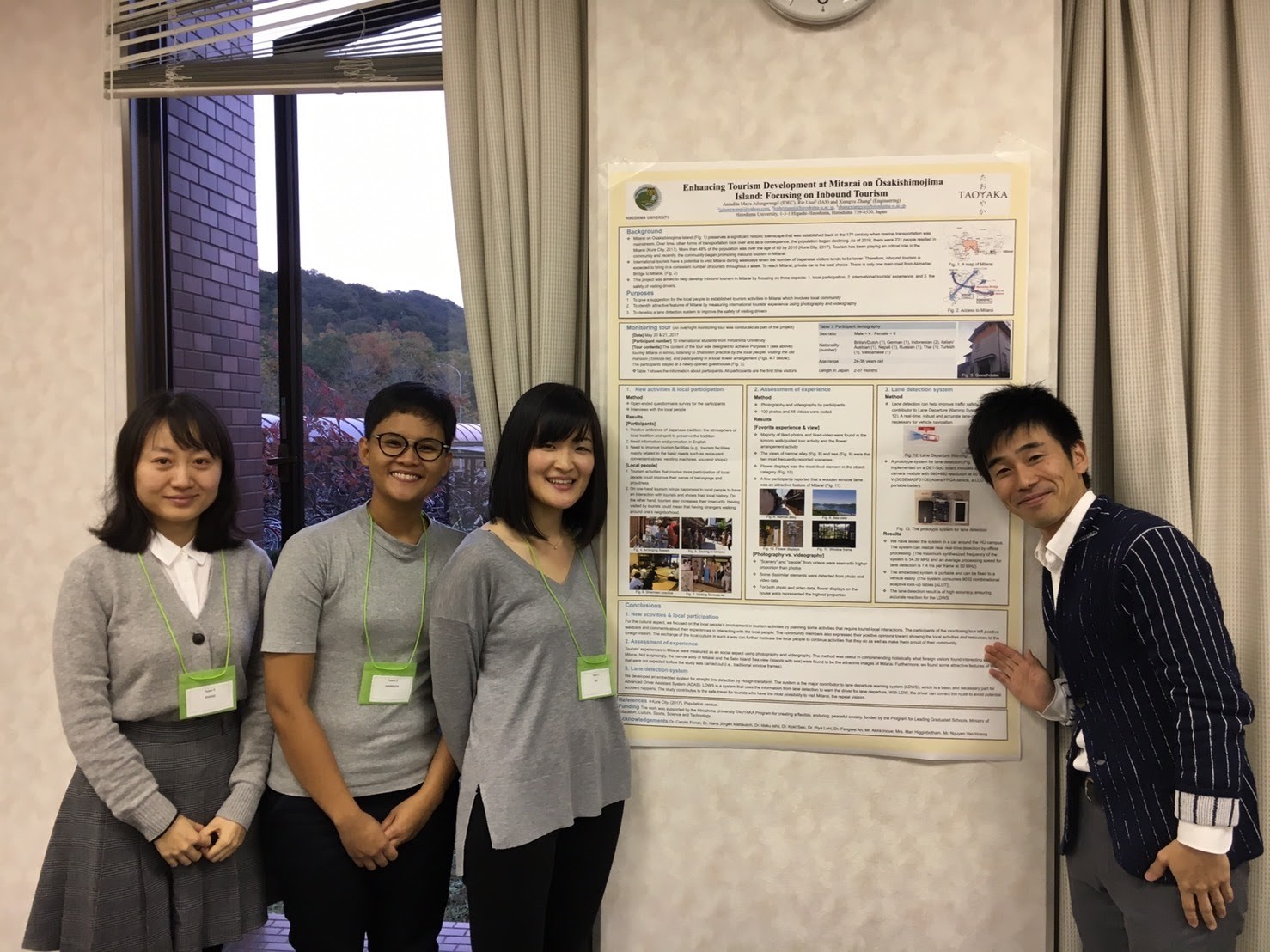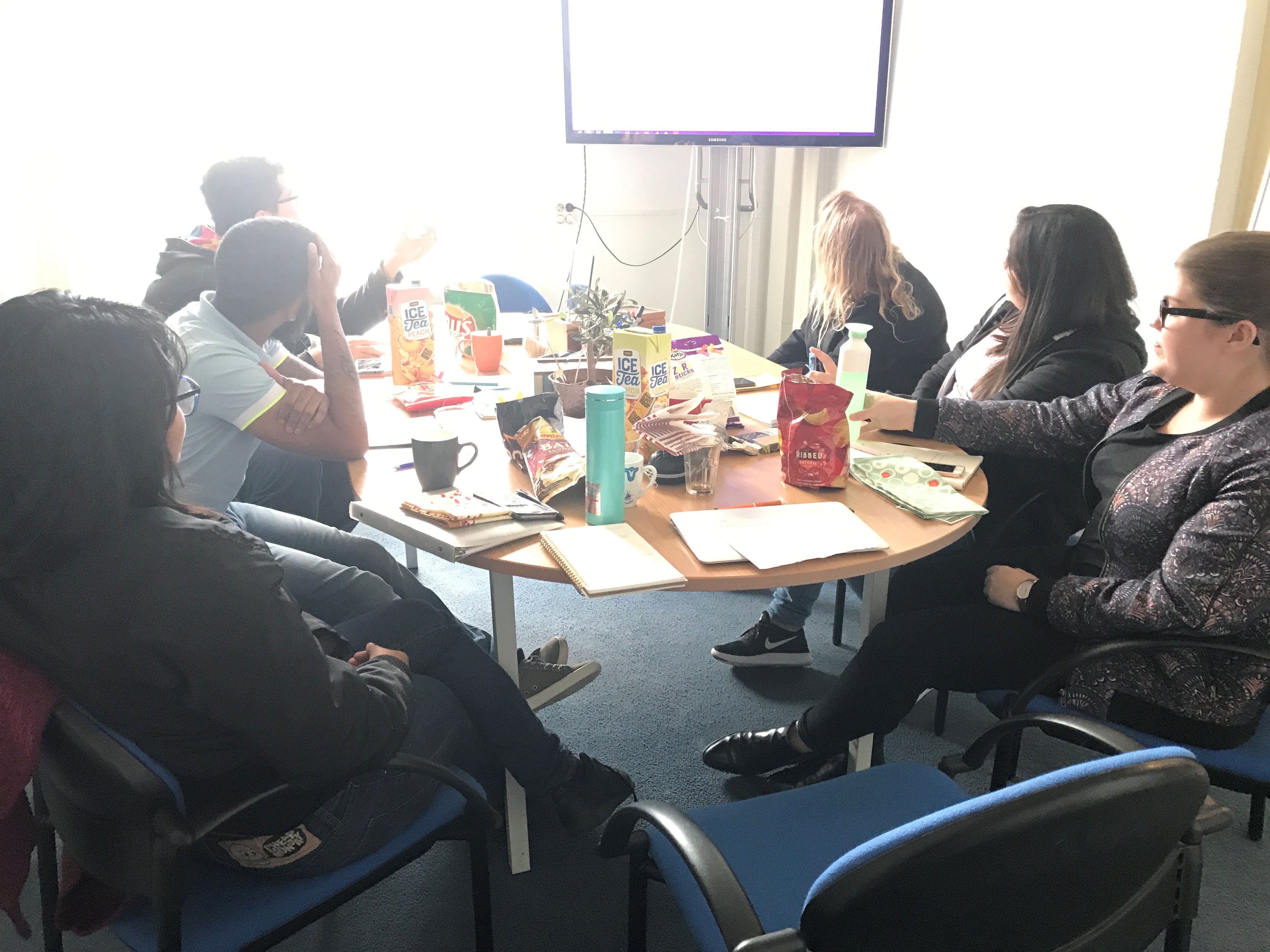動物に配慮した観光を目指して
取材日:2018年6月28日
総合科学研究科およびたおやかプログラムに所属の笛吹理絵さんにお話を伺いました。笛吹さんは動物にも配慮した社会をつくりたいという思いで、宮島、屋久島などの観光地において、「人間動物関係学」の視点を取り入れた観光研究をされています。そんな笛吹さんに博士課程後期に関するお話を伺いました。
In this interview, I would like to introduce to you Mrs. Rie Usui, who is pursuing her PhD at the Graduate School of Integrated Arts and Sciences at Hiroshima University. She belongs to the Taoyaka Program for Creating a Flexible, Enduring, and Peaceful Society, a five-year integrated PhD program. Motivated by her passion to create an animal-friendly society, she incorporates an interspecies vision from human-animal studies into her work on tourism.

【博士課程後期での主な活動内容】
2016年4月、たおやかプログラム博士課程3年次に編入。
2017年9月~10月、オランダのライデンにあるIIAE(International Institute for Animal Ethics) でインターンシップを行う
2019年3月、博士課程後期修了予定。
研究者を志したきっかけはなんですか / What made you pursue a research career path?
小学校4年生くらいの頃にテレビで「ココ」というゴリラが手話を使って人と会話をしているのを目にし、それがきっかけで、霊長類に興味を持つようになりました。霊長類に関して調べていくうちにジェーン・グドール博士やダイアン・フォッシー博士などの有名な女性霊長類研究者について知り、霊長類に関する研究がしたいと思うようになりました。また私が修士号を取得したアメリカのセントラルワシントン大学でお世話になったアドバイザーのローリー・シーラン先生がすごく良い方で、そういう身近な女性研究者との出会いに恵まれたのも、研究者を目指したいという思いを強くするきっかけになりました。
Several female researchers have influenced me during the course of my life. Originally, I wanted to become a primatologist. When I was in the fourth grade, I first saw a gorilla named Koko communicate with human researchers on TV using sign language–the event that got me interested in non-human primate species. I began gathering information about primates and related research. I soon learned about Dr. Jane Goodall and Dr. Dian Fossey, who inspired me to pursue a career in research. Another female researcher who played an important role in my life was Dr. Lori Sheeran, my academic advisor at Central Washington University in the United States, where I obtained my master’s degree. She was such a genuine person, and she became my role model as a researcher, teacher and mentor.

ローリー・シーラン先生が来日された際に、愛知県の犬山にて再会。大学卒業後も交流を続けています。
Dr. Lori Sheeran and I at Inuyama in Aichi when she visited Japan for the first time. I keep in touch with her even after I graduated from CWU.
どんなことを研究されているのですか / What is your research about?
主にワイルドライフ・ツーリズム(動物と関わりのある観光形態)に関する研究を行っています。「観光」というアクティビティは、人間中心的なものですが、私たちの娯楽のために単に動物を利用するだけでなく、どのようにしたら彼らの利益も考えた観光が行えるかを研究しています。具体的に、博士論文では日本の観光地である宮島、屋久島において、シカに焦点を当て、管理計画などの資料やインタビューを元に「野生動物」がどのように捉えられているのかを分析し、観光空間における人とシカの関係を政治生態学的アプローチを用いて把握しようとしています。この研究によって、人間と動物の双方がwin-winの関係に近づくことができる観光のあり方を提案したいと考えています。
I mainly conduct research on wildlife tourism, a type of tourism in which tourists encounter animals, or related fields. Generally, tourism is a human-centered activity. My vision and hope is to expand the moral consideration of animals, who are exploited for human benefit or entertainment. In my dissertation research, I use a political ecology approach to unpack how people perceive deer on Miyajima and Yakushima Islands, and how the deer are framed within a human political system as a result. I analyze discourse taken from interviews and wildlife management plans to achieve my objective. In the end, I hope to propose suggestions on how we can best work together to create tourism landscapes that balance the needs of humans and animals.
普段どのような生活を送っているのですか / What is your daily life like?
最近はオン-オフを心がけて研究を行っています。以前は1日中研究室に篭ることが多かったのですが、あまり集中できていないことに気づいたので、月に2回陶芸教室に行ったりして、研究で使う脳とは違う脳を動かすようにしています。
その他には週に5時間ライティングセンターで働き、学生のレポートを書く手助けを行っています。この仕事は、自分にとってもすごく勉強になっています。また今年の前期はライティング・グループにも参加していました。毎週金曜日の朝に2時間くらい、自分たちが書いた文章に対して意見を交換し合いながら、自分の研究に役立つ新しい視点やアドバイスをグループのメンバーからもらえたので、より良い論文を書くための有意義な時間になりました。
自分の研究以外に、他の大学の先生とのプロジェクトにも関わっていて、5月には長野県の地獄谷野猿公苑に行き、外国人観光客増加に伴う地域の変化や課題について聞き取り調査を行いました。またオーストラリアで開かれるワイルドライフ・ツーリズム学会に2015年から毎回参加しているのですが、そこで知り合った先生から声がかかり、今年から新しいプロジェクトにも関わらせてもらっています。
Lately, I’ve been trying to be more conscious about balancing my study/work and leisure time. I used to keep myself in the lab pretty much all day long to study, but I realized that I wasn’t being productive. I believe that giving myself some time to enjoy other activities actually helps increase my work productivity, so I go to a pottery class twice a month to give my brain a rest from studying.
Aside from doing my research, I work five hours a week at the university writing center as a graduate student tutor. This job not only helps improve students’ writing skills but also advances my own skills in writing. I try to take advantage of available writing opportunities at the university as much as I can. For instance, last semester, I joined a writing group. Every Friday for two hours, participants exchange comments on each other’s papers. This has helped me keep up with my writing and polish my paper.
Other than my own dissertation research, I’ve been working on projects with scholars from other universities. In May of 2018, I visited Jigokudani Monkey Park in Nagano and conducted interviews regarding the community’s challenges associated with international tourist growth. Also, I’ve been attending the Wildlife Tourism Conference, which is held in Australia, since 2015. I have been asked to partake in a new project with scholars whom I met at this conference.
たおやかプログラムではどのようなことをしているのですか / What do you do as a TAOYAKA student?
修士・博士課程5年間一貫のたおやかプログラムでは、博士課程1年次に、文化創成・技術創成・社会実装コースから1人ずつ、計3人の学生がチームを組んで、日本または海外の“条件不利地域”において約1年間のプロジェクトを実施します。私のチームは呉市御手洗において2016年10月頃にプロジェクトを開始しました。3人とも異なる分野だったので、1つのプロジェクトを行う上で、どのように接点を作るかなど苦労はありましたが、最終的には御手洗における外国人観光発展の可能性をテーマにして、モニターツアーを企画・実施し、参加者からのフィードバックをもとに、地域へ外国人観光に関する提案を行うことができました。
また2017年の9月から10月までの間、たおやかプログラムの支援で、オランダのライデンにあるIIAE(International Institute for Animal Ethics)という動物倫理に関する活動を行っているNPOでインターンシップを行いました。インターンシップ先では毎日忙しく、スーパーで販売されるエシカルな食品に関する調査やプレゼンテーションの準備、近くの大学の講義への参加など様々な業務を行っていました。インターンで実践的な活動をしたことは研究内容にも活かされていて、自分の中でとても良い経験となりました。
The Taoyaka Program is a five-year PhD program. In the third year of the program, students from the three different courses–Cultural Creation, Technical Creation, and Social Implementation– form a team to work on a project for about a year. Team projects can be conducted at “disadvantaged” regions in Japan or overseas. My team began a project in October 2016 in Mitarai in Kure City. It wasn’t easy working with my team members, who had dissimilar research interests, but we were able to somehow focus on the development of inbound tourism in Mitarai. We conducted a small tour in Mitarai and shared our results with the community at the end of the project.
From September to October in 2017, I had an internship at the International Institute for Animal Ethics (IIAE), located in Leiden, the Netherlands, as a partial requirement for the program. IIAE is an international NPO. I was busy during the week. The tasks included searching for green washing products at nearby grocery stores, preparing a presentation, and some office work. I also attended a lecture at Leiden University Medical Center. My internship work was very practical, which gave me a better idea of how to apply academic knowledge to a practical situation

プロジェクトの最終発表会にて。活動中にお世話になった井上さんとチームメンバー / With my team members and Mr. Inoue who helped our project.

インターンシップ先でのミーティングの様子/ Weekly meeting at IIAE.
取材者感想
笛吹さんはご自身の研究だけでなく幅広く活躍されており、研究だけを毎日行うという博士課程のイメージが大きく変わり、私自身の生活を見直す機会となりました。最後に貴重なお話を聞かせて頂き、楽しいインタビューの時間にしてくださった笛吹さんにこの場を借りてお礼申し上げます。ありがとうございました。
取材担当:国際協力研究科博士課程前期1年 矢野昌義
「より多くの方に記事を読んで欲しい」とのご厚意により、笛吹さんに上記記事の英訳をしていただきました。
ご協力ありがとうございました。

 Home
Home
